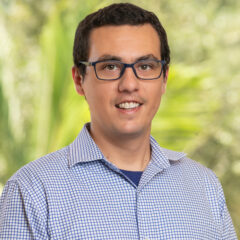Graeme Gardner
Assistant Professor

Contact
| [email protected] | |
| Phone | +1 561-237-7415 |
| Department | College of Arts and Sciences |
| Location | Assaf Academic Center Assaf 211 |
WhyLynn
Gardner chose Lynn because there is a clear focus on student enrichment through programs like their dialogues core curriculum, Course-based Undergraduate Research Experiences (CUREs) and the Social Impact Lab. He also believes in the universal philosophy of teaching with emphasis on the scientific method, something that is prevalent in the courses at Lynn.
Professional profile
Graeme Gardner is an assistant professor in the College of Arts and Sciences. He comes to Lynn University by way of the Diabetes Research Institute (DRI) in the Miller School of Medicine at the University of Miami, where he studied biomedical engineering under Professor Christopher Fraker. His research included developing biocompatible materials for cellular encapsulation and implantation, specifically to cure type 1 diabetes.
Prior to working at the DRI, Gardner worked for Visikol, a New Jersey-based contract research organization that performs advanced bioimage analysis and in vitro drug-screening services for pharmaceutical and biotech companies. He started working for Visikol in 2016 after collaborations with the founders that began in his graduate school training at Rutgers in the NSF-IGERT Fellowship program.
His current research interests continue to be in the synthesis and characterization of biocompatible polymers including hydrogels and derivatized polysaccharides for use in biomedical research or clinical applications. In addition, Gardner is interested in the development and application of advanced image analysis techniques and computer vision in the context of biology and medicine.
Education
- Ph.D. Chemistry, Rutgers, The State University of New Jersey
- B.S. Chemistry, Ramapo College of New Jersey
Teaching philosophy
Gardner’s teaching philosophy starts with an emphasis on the scientific method, which can be broadly applied to many areas of study outside of the sciences. Teaching in such a way helps students build a framework for how to learn, rather than a reliance on memorizing facts and figures. He also believes in enhancing scientific literacy through the dialogues course at Lynn. Scientific literacy is important at any age and is required for a well-informed public and for inspiring innovation. Simple scientific principles underpin every aspect of our lives, and it is the responsibility of teachers to encourage students to explore their surroundings and examine the world in new light with an open mind.
Teaching specialties
- Biochemistry
- Scientific Inquiry
Areas of scholarship
- Functionalized hydrogel polymers for biomedical research and clinical applications
- In vitro methods to improve recapitulation of in vivo physiology
- Advanced bioimage analysis
- Improving methods for teaching biochemistry techniques at the undergraduate and graduate levels
Awards and honors
- NSF-IGERT PhD Fellowship, “Solutions for Renewable and Sustainable Fuels in the 21st Century”, 2012-2016
- Excellence Fellowship, Department of Chemistry and Chemical Biology, Rutgers University, New Brunswick, NJ, 2011-2012
- Reid Award for Exceptional Performance in Research, 2016
- Van Dyke Research Award, 2012